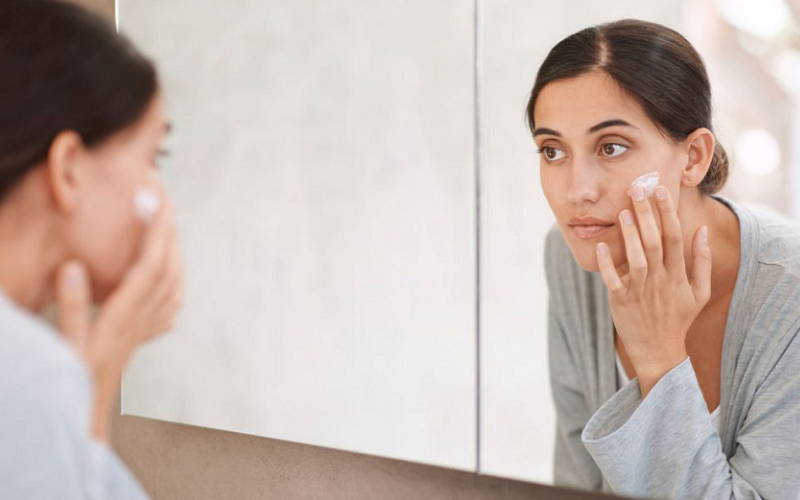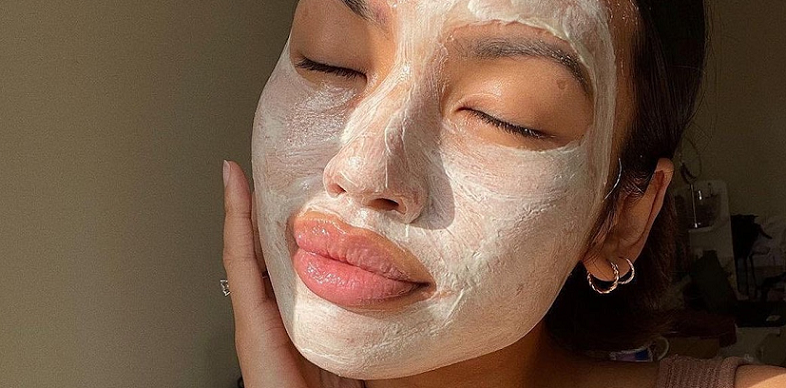
Skincare and mental health are intrinsically linked, as the condition of our skin can greatly affect our mood, confidence, and overall happiness. Conversely, our emotional state can influence the health and appearance of our skin. Recognizing this connection is essential for maintaining not only a radiant complexion but also a positive mindset. Here we explore the science behind skincare and mental health, discuss the benefits of a skincare routine for your emotional well-being, and provide practical tips for building a skincare routine that supports mental health.
Contents
- The Science Behind Skincare and Mental Health
- The Benefits of a Skincare Routine for Mental Health
- Building a Skincare Routine That Supports Mental Health
- Tips for Practicing Self-Care Through Skincare
- The Role of Diet and Lifestyle in Skincare and Mental Health
- Addressing Common Skincare and Mental Health Concerns
- References
The Science Behind Skincare and Mental Health
Before we dive into the practical aspects of skincare and mental health, it’s essential to understand the science behind their connection. By appreciating how hormones, stress, and psychological factors intertwine, we can create a solid foundation for an effective skincare routine that supports our emotional well-being.
Hormones and Skin Health
Hormones play a significant role in skin health. For example, an imbalance in hormones like estrogen, progesterone, and testosterone can lead to various skin issues such as acne, dryness, and premature aging. Furthermore, cortisol, also known as the stress hormone, can wreak havoc on our skin when produced in excess [1]. Understanding the role of hormones in skin health is crucial in developing an effective skincare routine that addresses our unique concerns.
The Impact of Stress on Skin
Stress is a common culprit when it comes to skin problems. When we experience stress, our body produces cortisol, which can cause inflammation, break down collagen, and lead to an overproduction of oil. This cascade of events can result in acne breakouts, dryness, redness, and even premature aging. By acknowledging the connection between stress and skin health, we can begin to develop strategies to minimize stress and support a healthy complexion.
The Psychological Effects of Skincare Issues
Our skin is often the first thing people notice about us, and any imperfections can affect our self-esteem and confidence. Skin conditions like acne, eczema, and rosacea not only cause physical discomfort but can also lead to feelings of self-consciousness, anxiety, and even depression. Recognizing the psychological impact of skincare issues is essential to finding the right balance in addressing both skin health and emotional well-being.

The Benefits of a Skincare Routine for Mental Health
Now that we have a deeper understanding of the science connecting skincare and mental health, let’s explore the various ways in which establishing a skincare routine can support our emotional well-being. A well-rounded skincare routine can provide numerous benefits beyond clear, radiant skin, including boosting confidence, promoting relaxation, and establishing a sense of control and routine [2].
Boosting Confidence and Self-Esteem
When we invest time and effort into taking care of our skin, we are more likely to see improvements in its appearance. As a result, our self-esteem and confidence can soar, making us feel more comfortable in our own skin. This boost in confidence can have a positive impact on our mental health, helping us feel better about ourselves and navigate social situations with ease.
Encouraging Mindfulness and Relaxation
A skincare routine can serve as an opportunity for self-care and relaxation. By dedicating time each day to focus on our skin, we create a space for mindfulness and self-reflection. This practice of self-care can help relieve stress and anxiety, ultimately promoting better mental health. As we apply our skincare products, we can use this time to breathe deeply, relax, and appreciate the present moment [3].
Establishing a Sense of Control and Routine
Having a consistent skincare routine can provide a sense of control and structure, especially during times of uncertainty or stress. By sticking to a regular regimen, we create a sense of order in our lives, which can be comforting and grounding. This routine can act as a mental anchor, offering stability and reassurance when other aspects of life may seem chaotic or unpredictable.
Building a Skincare Routine That Supports Mental Health
With a better understanding of the benefits of a skincare routine for mental health, it’s time to create a regimen tailored to your unique needs.
Identifying Skin Type and Concerns
Before choosing skincare products, it’s essential to identify your skin type and any specific concerns you may have. Skin types typically fall into one of four categories: normal, dry, oily, or combination. Additionally, you may have concerns such as acne, sensitivity, or signs of aging. By understanding your skin type and concerns, you can select products that will best address your needs and help you achieve your desired results [4].
Selecting the Right Skincare Products
Once you’ve identified your skin type and concerns, it’s time to choose the products that will make up your routine. Look for products that are designed for your specific skin type and address your concerns. Keep in mind that a well-rounded skincare routine typically includes a cleanser, toner, exfoliant, serum, moisturizer, and sunscreen. It’s essential to read product labels, research ingredients, and opt for high-quality products that will be gentle and effective.
Creating a Morning and Evening Routine
With your products selected, it’s time to establish a daily skincare routine. A morning routine generally focuses on cleansing, protecting, and preparing the skin for the day ahead. This routine may include using a gentle cleanser, applying a toner or serum, and finishing with a moisturizer and sunscreen. In contrast, an evening routine often emphasizes repair and rejuvenation. This routine might involve double cleansing, applying a treatment serum, and using a nourishing moisturizer or night cream.
Adapting to Seasonal Changes
As the seasons change, so do our skin’s needs. It’s important to recognize that your skincare routine may need to be adjusted throughout the year. For example, during colder months, you may need to incorporate more hydrating products to combat dryness, while in warmer months, you might focus on lighter formulations and increased sun protection. Listening to your skin and adapting your routine as needed will help maintain its health and appearance while supporting your mental well-being.

Tips for Practicing Self-Care Through Skincare
Incorporating self-care into your skincare routine can further enhance the connection between skin health and mental well-being.
Prioritizing Time for Skincare
To fully reap the mental health benefits of a skincare routine, it’s important to prioritize time for yourself. Set aside a few minutes each morning and evening to focus on your skin and engage in self-care. This dedicated time can serve as a mental break, allowing you to decompress and reset, ultimately supporting better mental health.
Incorporating Relaxation Techniques
Enhance your skincare routine by incorporating relaxation techniques such as deep breathing, aromatherapy, or meditation. These practices can help to relieve stress, promote relaxation, and create a more mindful and enjoyable experience. For example, you might take a few deep breaths as you apply your skincare products, or diffuse calming essential oils like lavender during your evening routine.
Embracing a Holistic Approach
A holistic approach to skincare and mental health acknowledges the interconnectedness of our physical, emotional, and mental well-being. By incorporating practices like exercise, proper nutrition, and stress management, you can support both your skin health and emotional state. Remember that your skincare routine is just one piece of the puzzle when it comes to maintaining a balanced and healthy lifestyle.
Seeking Professional Advice
If you’re struggling with a particular skin concern or finding it difficult to manage stress, don’t hesitate to seek professional advice. A dermatologist can help you address skin issues and recommend appropriate treatments, while a therapist or counselor can provide guidance and support for managing stress and mental health concerns. Remember, seeking help is a sign of strength and an essential aspect of self-care.

The Role of Diet and Lifestyle in Skincare and Mental Health
While a solid skincare routine is crucial for maintaining healthy skin and supporting mental well-being, it’s essential to recognize the role of diet and lifestyle in achieving optimal results.
The Impact of Nutrition on Skin Health
A well-balanced diet, rich in vitamins, minerals, and antioxidants, can have a significant impact on the health and appearance of your skin. Foods high in omega-3 fatty acids, vitamin C, and vitamin E can help reduce inflammation, boost collagen production, and protect the skin from environmental damage. Furthermore, a healthy diet can also improve mood and cognitive function, supporting overall mental health [5].
Exercise and Its Effects on Skin and Mood
Regular physical activity is not only essential for overall health but can also benefit your skin and mental well-being. Exercise increases blood flow, delivering essential nutrients and oxygen to the skin, promoting a healthy, radiant complexion. Additionally, exercise can help reduce stress, improve mood, and increase self-esteem, further supporting mental health.
Sleep and Its Connection to Skin Health and Mental Well-being
Adequate sleep is crucial for both skin health and mental well-being. During sleep, our bodies undergo essential repair and regeneration processes that help maintain healthy, youthful skin. Moreover, sufficient sleep can help reduce stress, improve mood, and enhance cognitive function, making it a critical component of overall self-care.
The Importance of Hydration
Proper hydration is vital for maintaining healthy skin and supporting mental health. Drinking enough water each day helps to keep the skin hydrated, plump, and glowing, while also aiding in the elimination of toxins. Additionally, staying hydrated can improve cognitive function, mood, and overall well-being, further emphasizing the importance of water intake in our daily self-care routines.
Addressing Common Skincare and Mental Health Concerns
Certain skin conditions can significantly impact mental health, and it’s essential to address both the physical and emotional aspects of these concerns.
Acne and Anxiety
Acne is a prevalent skin condition that can lead to feelings of self-consciousness and anxiety. To effectively address acne and its impact on mental health, it’s essential to use appropriate skincare products and treatments while also practicing self-compassion and stress management techniques. It’s crucial to remember that healing takes time, and it’s important to be patient with yourself and your skin.
Eczema and Depression
Eczema is a chronic skin condition characterized by dry, itchy, and inflamed skin. Living with eczema can be physically and emotionally challenging, often leading to feelings of depression and isolation. In addition to using targeted skincare products to manage eczema symptoms, it’s essential to seek support from a mental health professional to address the emotional aspects of living with a chronic skin condition.
Rosacea and Emotional Well-being
Rosacea is a skin condition that causes redness, flushing, and visible blood vessels on the face. People with rosacea may experience embarrassment or self-consciousness due to the appearance of their skin, which can impact emotional well-being. To effectively manage rosacea and its impact on mental health, it’s important to use gentle skincare products and treatments, practice stress management techniques, and seek professional help if needed. By addressing both the physical and emotional aspects of rosacea, you can improve your overall quality of life.
References
[1] Adult health
[2] The relationship between skincare and mental health
[3] Importance of Beauty and Skincare for Mental Health
[4] There’s scientific proof that a skincare routine can reduce stress
[5] How Chronic Skin Conditions Affect Mental Health







